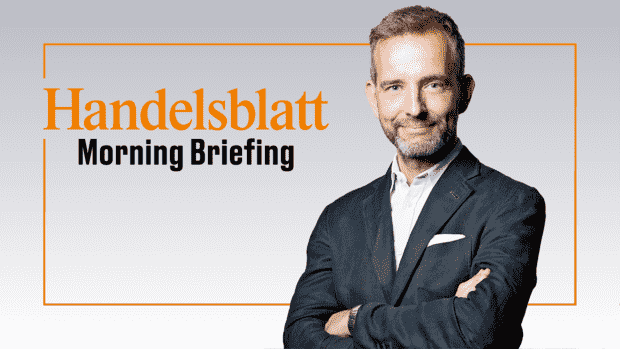There is a fun competition on NDR radio: anyone who manages to answer the moderator’s questions for one minute without using the terms “yes”, “no”, “black” and “white” wins a prize. Converted to the words “North”, “Stream” and “Two”, Chancellor Olaf Scholz is a master in this game. He not only held a press conference at the White House in Washington on Monday, but also did a ten-minute live interview on CNN, without saying the name of the controversial Baltic Sea pipeline – although he was asked about it again and again.
In a nod to the Harry Potter novels and the villain whose name no one wants to name, Green European politician Sergey Lagodinsky scoffs that the pipeline has become the “Voldemort of the current crisis”.
Why is Scholz shying away from saying what’s pretty obvious? And right next to him US President Joe Biden also clearly formulated? That Nord Stream 2 cannot become operational in the event of a Russian attack on Ukraine. In the Handelsblatt we are looking into two possible explanations today:
Top jobs of the day
Find the best jobs now and
be notified by email.
1. Scholz could send the message to Russian President Vladimir Putin submit personally want. On February 15, the Chancellor travels to Moscow. Scholz may be hoping to prevent further escalation with his reticence.
2. The Federal Government could also consider claims for damages of the operating company Nord Stream 2 AG. If the USA enforces the end of the pipeline with their sanctions, Germany might be off the hook.
(Photo: Phil Dera)
In any case, the EU Commission no longer hides the fact that it considers Nord Stream 2 to be a huge mistake by the Germans. “We never thought that Nord Stream 2 was in the European interest. That was already very clear during the initial planning,” said Vice President of the EU Commission, Margrethe Vestager, on Tuesday at the Europe 2022 conference, a cooperation between Handelsblatt, Zeit, WirtschaftsWoche and Tagesspiegel.
What the pipeline is for Scholz, the unpronounceable F-word is for French President Emmanuel Macron, which in this case stands for “Finland”. According to media reports, Macron spoke to Vladimir Putin about a possible neutral status for Ukraine, similar to what Finland had during the Cold War. To do this, Ukraine would have to give up its NATO ambitions – which the government in Kiev categorically rules out.
And so Macron that evening in Berlin only called for a general security dialogue with Russia, in which the Europeans would have to defend principles such as the inviolability of the borders.
Macron then met with Scholz and Polish President Andrzej Duda. This German-French-Polish discussion format, known in diplomatic jargon as the “Weimar Triangle”, last existed at top level eleven years ago – after that, Poland’s relations with the rest of the EU had cooled off significantly.
But: Nothing welds together as much as a common opponent.
Let’s move from the forbidden to the new words. Corona has given us a number of fascinating innovations. My personal top three of the pandemic neologisms:
3. Virus variant area, the
2. Bridge lockdown, the
1. Supply chain bottleneck, the
But what exactly is a bottleneck in the supply chain? Yes, of course, a ship gets stuck in the Suez Canal and someone gets Corona somewhere in China. But why does this mean that huge quantities of goods are still arriving late in stores months later?
The Handelsblatt logistics reporter Christoph Schlautmann has done what good journalism often means: He shows the big things in the small things. He has succeeded in tracing the path of a single television set from production in China to the customer in Berlin step by step, from the delivery of the necessary semiconductors – or the lack of them – to shipping and the reloading stops in Singapore, Rotterdam and Potsdam.
The delays add up from station to station for the most adventurous reasons. And suddenly it is supply chain bottleneck no longer an abstract neologism, but something very concrete.
One of the most unusual German entrepreneurs is dead. Götz Werner, the founder of the drugstore chain dm, died on Tuesday at the age of 78. Inspired by the teachings of Rudolf Steiner, Werner already relied on self-organization and personal responsibility in Germany’s largest drugstore chain, when “bottom up” was still translated as “butt up” in other companies.
Werner was considered a supporter of the unconditional basic income. His conviction, which is astonishing for a self-made billionaire: “The coupling of work and income is one of the fundamental errors of our system.”
One motivation for Werner’s professional success was the longstanding rivalry with Dirk Roßmann, who had built up a drugstore chain at the same time. “It was never foreseeable that I would be the one who would one day remain,” says Roßmann. And he gives Werner the last word: “I was often angry with you, but you were always a great guy.”
And then there is the 82 meter Russian motor yacht “Graceful”which, according to the ship tracking portal Marinetraffic.com, ended its stay at the Blohm + Voss shipyard in the Port of Hamburg on Monday, crossed the Kiel Canal and has been heading East ever since.
The special thing about this yacht is that it is supposed to belong to Putin or at least be at his disposal – the low official salary of a Russian president is not nearly enough for the purchase or maintenance of such a ship.
Speculations quickly sprouted: Does the yacht have to disappear from Germany as soon as possible in order to avoid confiscation in the event of a war in Ukraine? A story that is not necessarily true, but in any case an exciting one, which makes the London “Times” even nicer with the casual note that Blohm + Voss once launched the battleship “Bismarck” – which the British sank in 1941.
I wish you a day where you land hits.
Her
Christian Rickens
Editor-in-Chief Handelsblatt
